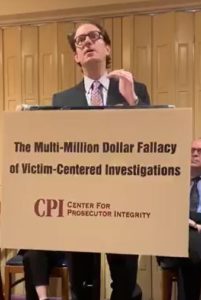Key Facts
Prosecutors play a preeminent role in America’s criminal justice system. While most prosecutors are ethical, a variety of factors can induce prosecutors to act in unethical ways.
Fact #1: Since 1989, there have been over 2,500 documented cases of persons who have been convicted and later exonerated (1).
Fact #2: An estimated 43% of wrongful convictions arise from misconduct involving prosecutors, police, investigators, and other officials (1).
Fact #3: More than 90% of criminal cases are adjudicated during closed-door plea-bargain negotiations. These cases have little or no public accountability (2).
Fact #4: The following are the most common types of ethical violations committed by prosecutors (3):
- Failure to disclose exculpatory evidence (Brady violation)
- Use of inadmissible or false evidence/lack of candor to the court
- Plea bargain offense
- Inflammatory statements/witness harassment
- Mischaracterizing the evidence
- Vouching
Fact #5: Fewer than 2% of cases of prosecutor misconduct are subject to public sanctions. When sanctions are imposed, they are often slight (4).
Fact #6: Americans are concerned about the fairness of our criminal justice system (5).
Citations:
- National Registry of Exonerations, UPDATE: 2012 The National Registry of Exonerations, April 3, 2013.
- Sapien J. and Hernandez S. Who Polices Prosecutors Who Abuse Their Authority? Usually Nobody.
- Center for Prosecutor Integrity. Registry of Prosecutorial Misconduct.
- Center for Prosecutor Integrity. An Epidemic of Prosecutor Misconduct. Appendix B (2013).
- Center for Prosecutor Integrity. Most Americans Doubt Fairness of Criminal Justice System, Reveals Center for Prosecutor Integrity. June 11, 2013.

